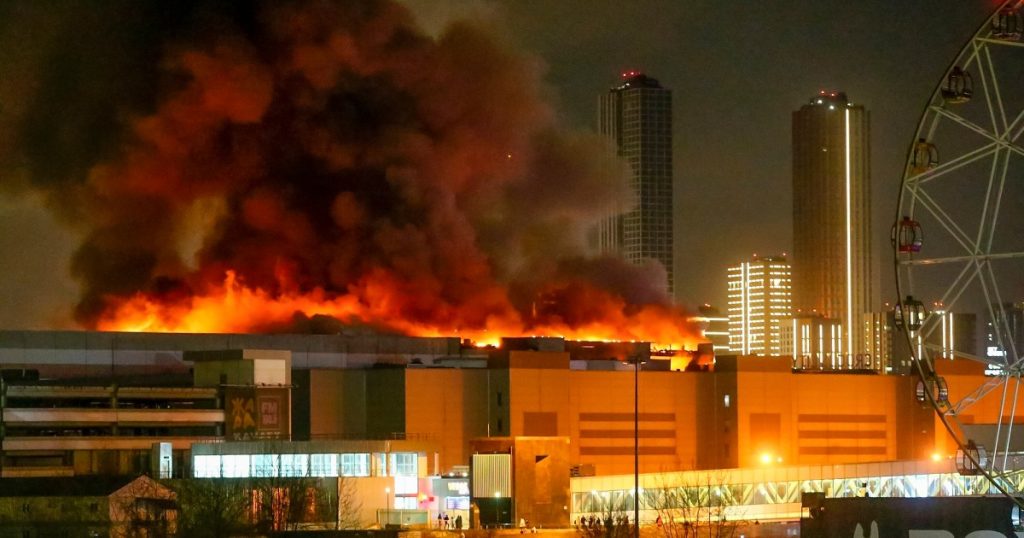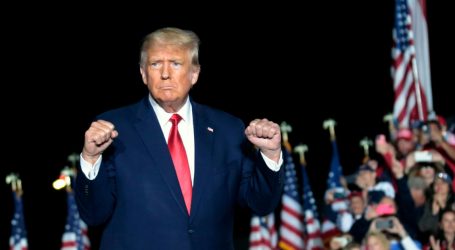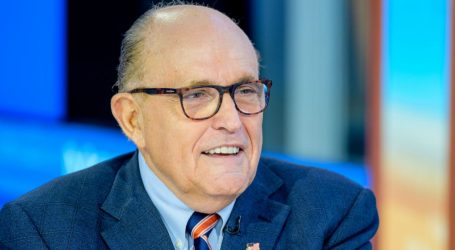A Deepfake Is Already Spreading Confusion and Disinformation About the Moscow Terror Attack
A massive blaze is seen over Moscow’s Crocus City Hall on Friday after several gunmen burst into the music venue and fired automatic weapons at the crowd, killing at least 133 people.Sergei Vedyashkin/AP
Fight disinformation: Sign up for the free Mother Jones Daily newsletter and follow the news that matters.After gunmen on the outskirts of Moscow opened fire at a popular concert hall Friday night, in the deadliest attack that Russia’s capital has seen in more than a decade, claims and counterclaims are now mounting about who is responsible for the violence, and a deepfake video is already adding to the swirl of disinformation.
In the hours after the attack at Crocus City Hall, which killed at least 133 people, the Islamic State claimed responsibility. US security officials blamed the Islamic State in Khorasan, a branch that works in Pakistan, Afghanistan, and Iran.
But some Russian lawmakers quickly pointed a finger at Ukraine, and Russia’s NTV television channel soon aired a deepfake video that fueled those suspicions. The fake video appeared to show Ukraine’s top security official, Oleksiy Danilov, speaking about the attack. “Is it fun in Moscow today?” he seemed to say, though he never actually did. “I think it’s a lot of fun. I would like to believe that we will arrange such fun for them more often.” The video mashed together AI-generated audio from recent interviews with two Ukrainian officials, including Danilov, according to BBC Verify reporter Shayan Sardarizadeh.
Russia’s NTV has broadcast a video falsely alleging that it shows Ukraine’s top security official Oleksiy Danilov say Ukraine was behind last night’s deadly attack at the Crocus City Hall near Moscow.
But the video is a deepfake, featuring an AI-generated audio of Danilov. pic.twitter.com/AKKuP24RBL
— Shayan Sardarizadeh (@Shayan86) March 23, 2024
The United States has “no indication at this time that Ukraine or Ukrainians were involved,” John Kirby, a spokesperson for President Biden’s National Security Council, told reporters at the White House, according to the New York Times. Mykhailo Podolyak, a top adviser to Ukraine’s presidential office, said in a statement that “Ukraine has absolutely nothing to do” with the attack.
Ukrainian officials were quick to volley counterclaims against Russia. The country’s Center for Countering Disinformation has accused Russia’s government of blaming Ukraine to drum up domestic support for Russia’s war in Ukraine. In a statement, Ukraine’s foreign ministry seemed to imply that the Kremlin orchestrated the attack to “fuel anti-Ukrainian hysteria in Russia society, create conditions for increased mobilization of Russian citizens to participate in the criminal aggression against our country, and discredit Ukraine in the eyes of the international community.”
“There are no red lines for Putin’s dictatorship,” the ministry added. “It is ready to kill its own citizens for political purposes.”
On Saturday, Russian President Vladimir Putin said 11 suspects had been detained, including the four gunmen believed to have carried out the attack, which he described as “a bloody, barbaric terrorist act.” Putin implied they were caught trying to cross the border into Ukraine, according to the Associated Press. Russian news reports said the gunmen were from Tajikistan, a former Soviet country that borders Afghanistan and is predominantly Muslim. Tajikistan government officials denied initial allegations that Tajiks were involved in the attack but didn’t comment on the arrests.
Sam Greene, a director at the Center of European Policy Analysis, wrote on the social media site X that regardless of who’s actually responsible for the violence at the concert hall, Putin will try to use it to his advantage. “Having failed to prevent it, the Kremlin will likely look for a way to use it, which may well mean blaming Ukraine,” he wrote, adding: “The fact that the Kremlin will use the attack for political purposes does not mean it was a false flag.”
More than two weeks ago, on March 7, the US Embassy in Moscow said it was “monitoring reports that extremists have imminent plans to target large gatherings in Moscow, to include concerts.” US officials briefed Russia privately about intelligence on Islamic State activity, according to the New York Times. Earlier this week, Putin said US warnings about a terrorist attack were just “an attempt to frighten and destabilize our society.”





